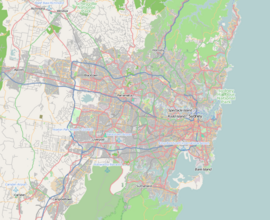|
The Mark (Sydney)
The Mark is a residential apartment complex located in Central Park, a redevelopment site located adjacent to Broadway in Chippendale, in the City of Sydney local government area of New South Wales, Australia. The building comprises two building groups: Mark One and Mark Two. Mark One is level 1–19, which primarily one and two bedroom floor plans. Mark Two is level 20–27, with two and three bedroom apartment units. DescriptionThe Mark is located south of the Sydney central business district, in the Central Park development, which comprises residential, retail and commercial. Central Park was jointly developed by Frasers Property and Sekisui House Australia and was designed by Johnson Pilton Walker. The development was contracted to Watpac.[1] The entire Central Park project site covered 15 hectares (37 acres) on Broadway. It is a redeveloped industrial site, with boundaries at O'Connor Street, Carlton Street, Broadway and Chippendale Way. The Central Park redevelopment delivered 1,426 apartments and total gross floor area (GFA) of over 150,000 square metres (1,600,000 sq ft), which GFA for The Mark is 24,000 square metres (260,000 sq ft). The building was one of the stage two development of Central Park, which was started in September 2011 and was completed in August 2014. Features
Sustainability features
Awards
Heritage The site formally was Carlton & United Breweries site in Chippendale. Heritage consultants Godden Mackay Logan was engaged to undertake the comprehensive site survey, analysis, archaeological investigation and documentation. Urbis, who is heritage architect was engaged to adaptively reuse of heritage structures in collaboration with the project architects. In the end, there are 33 items were identified as heritage items and have been retained. The heritage items including the tiled arch at Kent Road, terraces and warehouses along Kensington Street, three hotels, the brewery yard buildings and brick stack and the administration building will be[when?] restored or adaptively reused.[citation needed] See alsoReferences
External links |
||||||||||||||||||||||||||||||||||||||

